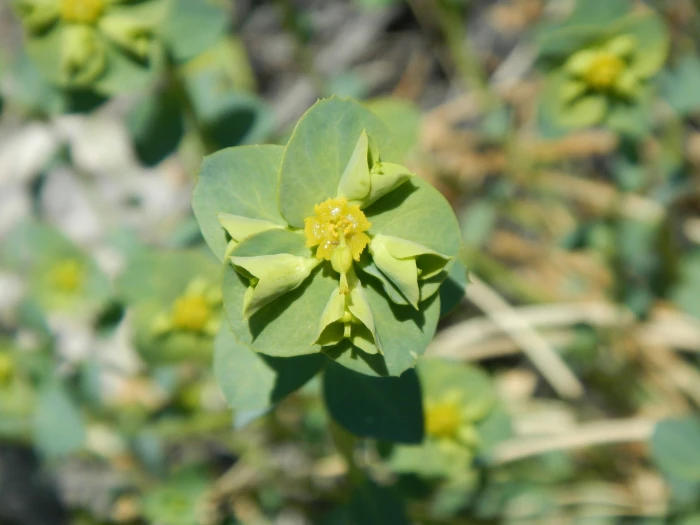Mojave Spurge
(Euphorbia schizoloba)
Mojave Spurge (Euphorbia schizoloba)
/
/

Dawn Nelson
CC BY 4.0
Image By:
Dawn Nelson
Recorded By:
Copyright:
CC BY 4.0
Copyright Notice:
Photo by: Dawn Nelson | License Type: CC BY 4.0 | License URL: http://creativecommons.org/licenses/by/4.0/ | Rights Holder: Dawn Nelson | Publisher: iNaturalist | Date Created: 2017-04-09T12:41:11-07:00 |























Estimated Native Range
Climate Requirements
| • Precipitation | 10" - 12" |
| • High Temp. | 82°F - 100°F |
| • Low Temp. | 20°F - 36°F |
Summary
Euphorbia schizoloba, commonly known as Mojave spurge, is a perennial herb native to the arid desert hills and mountainous regions of the southwestern United States, particularly in the Mojave Desert. It is adapted to survive in harsh, dry conditions and is often found in rocky or sandy soils. Mojave spurge typically produces upright, unbranched stems that can reach up to 16 inches tall, with leaves that are alternately arranged along the stem. The plant is characterized by its small, bell-shaped bracts that surround the true flowers, which are inconspicuous. These bracts are typically greenish-yellow and may have a reddish tinge. The flowering season for Euphorbia schizoloba is in the spring, and while the flowers are not particularly showy, they are unique and add textural interest to the landscape.
In cultivation, Mojave spurge is valued for its drought tolerance and its ability to thrive in challenging conditions with minimal care. It is often used in xeriscaping, rock gardens, and as a specimen plant in desert-themed landscapes. Gardeners should provide Mojave spurge with well-draining soil and full sun exposure to mimic its native habitat. It requires little water once established, making it an excellent choice for water-wise gardening. While it is generally free from serious pests and diseases, it is important to note that like other euphorbias, the sap of Mojave spurge is toxic and can cause skin irritation upon contact. Therefore, caution should be exercised when handling the plant, and it should be kept away from children and pets.CC BY-SA 4.0
In cultivation, Mojave spurge is valued for its drought tolerance and its ability to thrive in challenging conditions with minimal care. It is often used in xeriscaping, rock gardens, and as a specimen plant in desert-themed landscapes. Gardeners should provide Mojave spurge with well-draining soil and full sun exposure to mimic its native habitat. It requires little water once established, making it an excellent choice for water-wise gardening. While it is generally free from serious pests and diseases, it is important to note that like other euphorbias, the sap of Mojave spurge is toxic and can cause skin irritation upon contact. Therefore, caution should be exercised when handling the plant, and it should be kept away from children and pets.CC BY-SA 4.0
Plant Description
- Plant Type: Herb, Shrub
- Height: 1-1.5 feet
- Width: 1.25-1.75 feet
- Growth Rate: Moderate
- Flower Color: Green, Orange, Yellow
- Flowering Season: Spring, Summer
- Leaf Retention: Deciduous
Growth Requirements
- Sun: Full Sun
- Water: Low
- Drainage: Fast
Common Uses
Drought Tolerant, Low Maintenance, Rock Garden
Natural Habitat
Arid desert hills and mountainous regions of the southwestern United States, particularly in the Mojave Desert
Other Names
Common Names:
Scientific Names: Euphorbia schizoloba, Euphorbia incisa, Euphorbia incisa var. incisa, Tithymalus incisus, Tithymalus schizolobus
GBIF Accepted Name: Euphorbia schizoloba